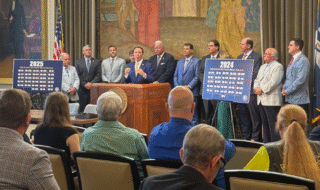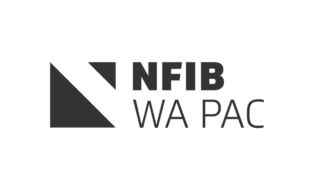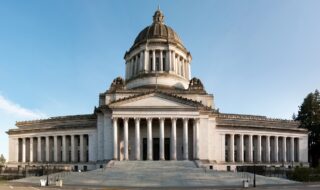February 23, 2024
NFIB battling six bills, fighting for passage of two as the 2024 session of the Washington State Legislature inches toward its March 7 close.
State Director Patrick Connor reports from Olympia on the small business agenda for the legislative weeks ending February 16 & 23
It’s been a busy two weeks.
Tuesday, February 13, marked the House of Origin cut-off, which was the deadline for each chamber to pass bills its members had introduced. As a Valentine’s gift, public hearings resumed February 14 with committees considering bills that had passed the opposite chamber.
The second policy cut-off occurred Wednesday, February 21. Since then, tax and budget-writing committees have been holding lengthy meetings, often late into the night, debating bills and amendments to this year’s supplemental budgets. Senate Ways & Means is meeting tomorrow, Saturday, February 24, to hear more than two dozen more bills in advance of the Monday, February 26, second fiscal cut-off.
As a result of these deadlines, NFIB is now tracking 33 bills of interest to small-business owners, about a quarter of the amount we flagged at the start of session.
In the midst of all that, we also held our annual Small Business Day at the Capitol. NFIB thanks our presenters, including Rep. Kelly Chambers; Mike Webb, chief of staff to Attorney General Bob Ferguson; Katie Beeson, Washington Food Industry Association government affairs director; contract lobbyist Samantha Louderback, representing the Washington Hospitality Association; and keynote speaker Sen. Mark Mullet, vice chair (capital budget) of the Senate Ways & Means Committee. We are also grateful for our sponsors, America’s Phone Guys, Larson Financial Group LLC, and Rock Point Oyster Co. NFIB also thanks its members and guests who attended.
Among the bills NFIB is still watching, we are particularly concerned about the following:
- HB 1589, Natural gas ban (Senate Rules) The bill would allow Puget Sound Energy to halt extension of gas supply lines to new developments and eventually abandon service to existing natural gas customers. The bill is in Senate Rules and could be added to the floor calendar at any time. NFIB opposes the bill.
- HB 1893, Unemployment for striking workers (Senate Rules) NFIB launched an Action Alert for this bill on Small Business Day, February 20. Our prior efforts played a role in defeating the companion bill in the Senate. We need your help to stop this version as well. The bill would tip the scales in labor negotiations heavily in favor of unions by reducing or relieving their obligation to establish a strike fund to provide for their members while striking. It would punish the business being struck by adding these unemployment insurance (UI) benefits to the employer’s experience-rated charges, and would likely lead to across-the-board UI tax increases on all businesses if the employer hits the tax cap or closes due to the strike. If you haven’t already, please contact your senator now to ask for a NO vote on HB 1893. NFIB opposes the bill.
- HB 1927, Workers’ compensation temporary total disability (Senate Rules) This bill would increase workers’ compensation payouts for these claims, increasing premiums due to experience rating, and potentially creating overpayment situations where injured workers must repay the State Fund for unearned benefits, without expediting actual payment of benefits when a final determination is made. NFIB opposes the bill.
- HB 2072, Antitrust penalties (Senate Rules) This Attorney General-request legislation would replace the outdated $900,000 penalty cap with a triple-actual-damages penalty, which better aligns with the harm done by anticompetitive tactics to small businesses and other consumers. NFIB supports the bill.
- HB 2118, Gun shop building requirements (Senate Rules) The proposed standards are excessive and threaten to put law-abiding gun shops out of business. One NFIB member received a bid to install surveillance cameras and provide data storage as required by the bill with a cost estimate of nearly $300,000. That does not include additional costs to meet structural requirements the bill would add. HB 1927 also provides a template to force the closure of other small businesses under the guise of building and “safety” codes. NFIB opposes the bill.
- HB 2266, Sanitary facilities on construction sites (Senate Rules) While we appreciate the intent of the bill, several provisions would be largely unworkable on undeveloped construction jobsites. For instance, an earth-clearing contractor would have great difficulty providing a private, lockable facility that is not a bathroom, for the expression of breastmilk, cleaning of pumping equipment, and milk refrigeration. The bill would require contractors provide workers an “… adequate and convenient supply of menstrual hygiene products …” and allow workers to file complaints against their employers over: — quantity — quality — brand — type — features of those products — convenience of the product storage location — or for misidentifying which workers may need those products. The bill would put both employers and workers in uncomfortable situations where inquiries or requests regarding the provision of products and facilities may be unwelcome or intrusive. NFIB opposes the bill.
- SB 5778, Employer political speech (House Rules) This bill goes far beyond protecting workers from hearing unwanted information about an employer’s political or religious opinions. It would prevent an employer from explaining the risks or benefits of unionization, describing regulations or legislation affecting the business or the employees themselves, or even expressing an opinion on topics required to be covered at government-mandated employee gatherings (like safety meetings). Similar laws in other states are being litigated based on federal preemption under the National Labor Relations Act and US Constitution. NFIB opposes the bill.
- SB5980, WISHA timeline (House Rules) The bill establishes a 10-day goal for the Department of Labor & Industries (L&I) to notify residential contractors of violations noted during a safety and health inspection. It would also require the department to report its progress toward that goal to the Legislature. L&I should more rapidly notify employers of existing and potential hazards on jobsites. NFIB supports the bill.
Also of note, the Legislature will hold joint committee hearings to consider three of the six citizen initiatives to the Legislature that have qualified for the ballot:
- Tuesday, February 27, 12:30 p.m. Joint Senate Ways & Means, House Finance hearing HI/SI 2111, Concerning taxes on personal income
- Wednesday, February 28, 8:00 a.m. Joint Senate Early Learning & K-12 Education, House Education hearing HI/SI 2081, Concerning parental rights relating to their children’s public school education
- Wednesday, February 28, 9:00 a.m. Joint Senate Law & Justice, House Community Safety, Justice, & Reentry HI/SI 2113, Concerning vehicular pursuits by peace officers
It is likely those three will be approved by the Legislature, with the remaining three sent to the ballot where Big Labor is poised to spends tens of millions of dollars to defeat the measures. As mentioned above, Monday (February 26) is the final fiscal cut-off. Next Friday, March 1, is the second floor-action cut-off. And, session is scheduled to end by midnight March 7.
Previous Weekly Reports and Related News
- January 25-News Release: NFIB Says Senate Should Reject Bill Paying Workers to Strike
- January 19-Gag Order on Employers? Unemployment Benefits for Striking Workers?
- January 12-Legislature Begins 2024 Session

NFIB is a member-driven organization advocating on behalf of small and independent businesses nationwide.
Related Articles














